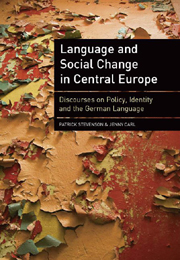Book contents
- Frontmatter
- Contents
- Acknowledgements
- List of Tables
- Transcription Conventions
- Map of Central Europe
- 1 Introduction
- 2 Discourses on Language in Social Life: Theoretical and Methodological Orientations
- 3 Sociolinguistic Histories and the Footprint of German in Eastern Central Europe
- 4 Language Policy Discourses: Interventions and Intersections
- 5 Language (Auto)biographies: Narrating Multilingual Selves
- 6 Language Ideologies: Negotiating Linguistic Identities
- 7 Conclusions
- Appendix A European Institutions and Documents Concerning Language Policy
- Appendix B Preamble to the European Charter for Regional or Minority Languages
- Appendix C Introduction to the 2005 Commission Communication ‘A New Framework Strategy for Multilingualism’
- Appendix D Introduction to the 2008 Commission Communication ‘Multilingualism: an asset for Europe and a shared commitment’
- Appendix E German and Austrian agents and institutions in foreign cultural policy
- Appendix F Extract from ‘Auswärtige Kulturpolitik – Konzeption 2000’
- Appendix G Central focus – ‘Leitbild’ – of the Goethe-Institut
- Appendix H Austria's Auslandskulturkonzept NEU
- Appendix I Plattform Kultur Mitteleuropa – Platform Culture Central Europe
- Appendix J Extract from Austria kulturint – Tätigkeitsbericht 2002
- Appendix K Czech 2001 White Paper on Education
- Appendix L Czech 2004 Education Act
- Appendix M Extract from Czech Follow-up of Action Plan on Language Learning and Linguistic Diversity
- Appendix N Hungarian 1997 Directive Concerning the Education for National and Ethnic Minorities
- Appendix O Extract from 2007 Hungarian National Core Curriculum
- Appendix P Extract from Hungarian Follow-up of Action Plan for Language Learning and Linguistic Diversity
- References
- Index
Appendix J - Extract from Austria kulturint – Tätigkeitsbericht 2002
Published online by Cambridge University Press: 05 February 2013
- Frontmatter
- Contents
- Acknowledgements
- List of Tables
- Transcription Conventions
- Map of Central Europe
- 1 Introduction
- 2 Discourses on Language in Social Life: Theoretical and Methodological Orientations
- 3 Sociolinguistic Histories and the Footprint of German in Eastern Central Europe
- 4 Language Policy Discourses: Interventions and Intersections
- 5 Language (Auto)biographies: Narrating Multilingual Selves
- 6 Language Ideologies: Negotiating Linguistic Identities
- 7 Conclusions
- Appendix A European Institutions and Documents Concerning Language Policy
- Appendix B Preamble to the European Charter for Regional or Minority Languages
- Appendix C Introduction to the 2005 Commission Communication ‘A New Framework Strategy for Multilingualism’
- Appendix D Introduction to the 2008 Commission Communication ‘Multilingualism: an asset for Europe and a shared commitment’
- Appendix E German and Austrian agents and institutions in foreign cultural policy
- Appendix F Extract from ‘Auswärtige Kulturpolitik – Konzeption 2000’
- Appendix G Central focus – ‘Leitbild’ – of the Goethe-Institut
- Appendix H Austria's Auslandskulturkonzept NEU
- Appendix I Plattform Kultur Mitteleuropa – Platform Culture Central Europe
- Appendix J Extract from Austria kulturint – Tätigkeitsbericht 2002
- Appendix K Czech 2001 White Paper on Education
- Appendix L Czech 2004 Education Act
- Appendix M Extract from Czech Follow-up of Action Plan on Language Learning and Linguistic Diversity
- Appendix N Hungarian 1997 Directive Concerning the Education for National and Ethnic Minorities
- Appendix O Extract from 2007 Hungarian National Core Curriculum
- Appendix P Extract from Hungarian Follow-up of Action Plan for Language Learning and Linguistic Diversity
- References
- Index
Summary
AUSLANDSKULTURPOLITISCHE INITIATIVEN
Plattform Kultur Mitteleuropa
Im Rahmen der ”Regionalen Partnerschaft“, wurde 2001 die ”Plattform Kultur Mitteleuropa“ ins Leben gerufen, die eine enge Kooperation der Auslandskulturaktivitäten mit den EU-Beitrittskandidaten Polen, Slowakei, Slowenien, Tschechien und Ungarn vorsieht. Die Plattform versteht sich als Forum zur Förderung des kulturellen Dialogs und zur Unterstützung bilateraler und multilateraler Kulturprojekte, die gemeinsame mitteleuropäische Kulturinteressen beinhalten.
Konkret will die Plattform:
– gröβere Breitenwirkung für Information erreichen und ein Bewusstsein für das kulturelle Leben der teilnehmenden Staaten innerhalb Mitteleuropas, innerhalb der Europäischen Union und darüber hinaus schaffen
– die kreative Dichte und Ausdruckskraft unserer Künstler darstellen sowie
– die gemeinsame kulturelle Identität Mitteleuropas im Zusammenhang mit der europäischen Integration sichtbar machen.
Durch die bevorstehende Erweiterung der Europäischen Union nimmt für Österreich die Bedeutung der mitteleuropäischen Dimension und die Vertretung gemeinsamer Interessen und Vorstellungen enorm zu. Die enge Zusammenarbeit der mitteleuropäischen Länder in einer gefestigten Partnerschaft ist ein Beitrag zu einem kulturelleren Europa und ein Gegengewicht zu einer möglichen Erstarkung nationaler Egoismen. Die Plattform ist daher zu einem zentralen Schwerpunkt österreichischer Auslandskulturpolitik in einem erweiterten Europa geworden. Die Grundidee der Plattform Kultur Mitteleuropa – Informationen über den Kulturraum Mitteleuropa zu geben und gemeinsame Projekte zu initiieren – stellt somit eine Investition in die Zukunft einer erweiterten Europäischen Union dar.
- Type
- Chapter
- Information
- Language and Social Change in Central EuropeDiscourses on Policy, Identity and the German Language, pp. 231 - 233Publisher: Edinburgh University PressPrint publication year: 2010

